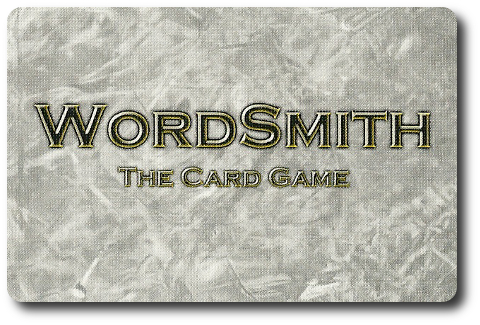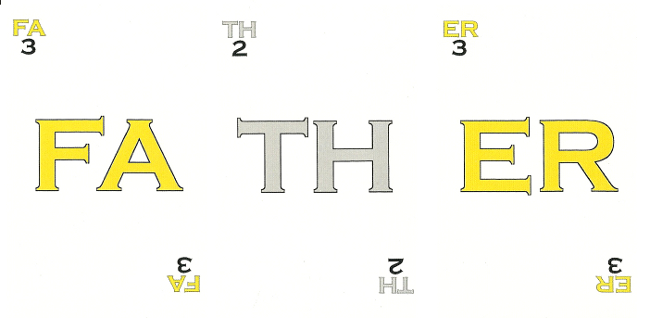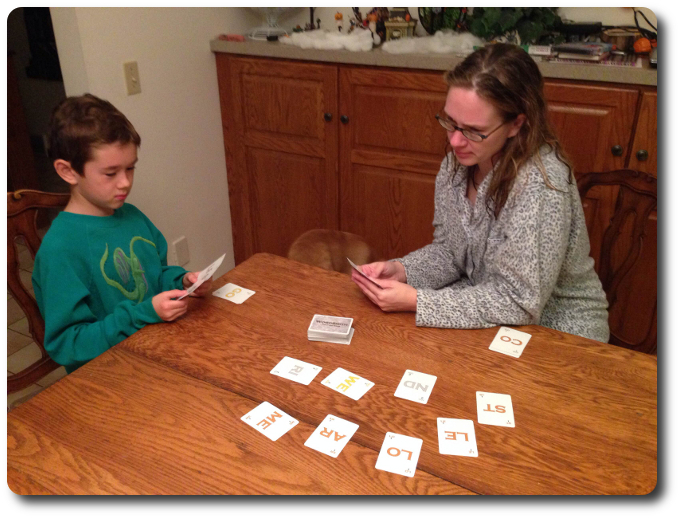
The Basics:
- For ages 9 and up (publisher suggests 4+)
- For 2 to 10 players
- Variable game play length
Geek Skills:
- Active Listening & Communication
- Counting & Math
- Logical & Critical Decision Making
- Reading
Learning Curve:
- Child – Easy
- Adult – Easy
Theme & Narrative:
- None
Endorsements:
- Gamer Geek rejected!
- Parent Geek approved!
- Child Geek rejected!
Overview
To write is to create substance out of nothingness. Painters use colors, sculptures use clay, and writers use words. A writer’s canvas is the mind of the reader and their paint is pure emotion. To be a wordsmith is to be a creator of visions and ideas. A single word or sentence can stir the imagination of an individual and rouse nations to war. And it all begins with a single letter that turns the gears of change and destiny.
WordSmith, a self-published game designed by Alistair Wong, is comprised of 107 cards. Each card has 2 letters on them and a number value (used to count points). No other artwork is present except for the game’s title on the back of the card. The cards are very durable and the overall quality of the game is excellent.
Game Set Up
To set up the game, first remove the one card that contains the instructions to the game and set it aside.
Second, shuffle the rest of the cards together and deal 10 cards, face-up, to the center of the playing area. This area is now referred to as the “Workshop”.
Third, deal 3 cards to each player, face-down. Players should pick up and look at their cards, but keep them hidden from their opponents at all times.
Fourth, place the remaining cards next to the Workshop, face-down, and within easy reach of all the players. This is the draw deck for the duration of the game.
This completes the game set up. Determine who will go first and begin.
Crafting Words
Note: The rules that come with the game are incomplete. In order to understand how to play the game correctly, you need to go to the game’s website. The complete rules are explained here for your convenience.
WordSmith is both a Word game and a Real-Time game. All players will be attempting to spell words as quickly as possible. When a game starts, it does not end until the endgame condition has been met.
When the game set up has been completed and all the players have had a moment to review the cards in the Workshop and in their hand, the dealer shouts “Go!” and all the players begin to play the game simultaneously. Each player will be attempting to complete the following sequential steps, but keep in mind that all the player’s opponents will be attempting to complete the same steps at the same time. A sharp ear, a critical eye, and a quick mind are necessary not only to play but also to keep tabs on your opponents!
Step 1: Look for a Word
The player quickly scans the Workshop for at least 1 face-up card that can be combined with 1 card from their hand to create a word. The player cannot touch any of the cards in the Workshop at this time. The letters on the player’s cards in their hand and those on the face-up cards in the Workshop can be used in any combination, but cannot be split. For example, a card that has the letters “FA”, can be used to start a word, to end a word, or be in the middle of a word, but can never be broken up so the “F” and the “A” are separated.
Step 2: Smith a Word
Using no more than 1 card from their hand and at least 1 face-up card from the Workshop, the player now places the card from their hand and quickly snatches the other cards they need to create their word. The cards must be sorted so the word is spelled correctly. The player then shouts the word. If the word is not challenged by the player’s opponents (challenges can be declared if the word is believed to be misspelled or not a real word), the player leaves the card they used from their hand in the Workshop and collects the Workshop cards they used to craft the word. The collected cards go to a scoring pile next to the player referred to as the “Smith” pile

Example of a card play: “FA” was placed from the player’s hand to the table and “TH’ and “ER” were attached from the Workshop for the “WIN”
If a word is challenged and found to be spelled incorrectly or not be a real word, the player must continue to look for a word to craft. The player is not penalized for trying, but they did lose precious time!
Step 3: Draw 1 Card
After the player places the card or cards used to craft their word in their Smith pile. they draw 1 card from draw deck to bring their hand back up to 3 cards. During most of the game, the player will always have 3 cards in their hand to work with. As the game progresses, the draw deck will be depleted and the player will not be able to draw new cards.
This completes a single play. The player now continues by scanning the Workshop in hopes of being able to craft new words.
No Words Found
During the game, it is completely possible that none of the players can craft a word. If everyone agrees, each player places 1 card from their hand face-up to the Workshop and draws 1 new card (if possible). Then, after each player has had a moment to look at their new card and the Workshop, game play resumes.
Getting the Last Word
The endgame is triggered when the draw deck is depleted. Game play continues as normal except none of the players draw a new card after they score cards to their Smith pile.
The game ends as soon as one player places their last card from their hand to craft a word. Game play now stops and any remaining cards in the players’ hands are placed with any remaining cards face-up in the Workshop. These cards are no longer part of the game and can be set aside.
Players now take their Smith pile and determine their score by adding the number values on each of the cards. The player with the highest score wins the game!
To learn more about WordSmith, visit the game’s official website.
Prediction
Like most word or language games, the player with the larger vocabulary and stronger spelling skills will always dominate the competition. This immediately puts WordSmith in a bad position when it comes to family play. Especially if the family has younger Child Geeks. I have no idea why the game suggests it can be played by players as young as 4-years-old. I’ve met some impressive spellers who are only 4, but only in the sense they could spell their name, a few colors, and an animal or two. Much more skill is needed to play WordSmith at a competitive level. Specifically, physical speed, mental speed, and a larger vocabulary than a typical 4-year-old might have. I’ll try the game with my 4-year-old and my 6-year-old, but I don’t think the game will appeal to either of them. My 9-year-old will have no problem playing the game.
For the Parent Geeks, I think WordSmith will be well received. The game is fast, focused, and casual. Best of all, the game’s concept and method of play is one that non-gamers and inexperienced gamers can quickly grasp. If the Parent Geeks play WordSmith with just their peers, the game should feel balanced. The moment the Parent Geeks play the game with the Child Geeks, I think we’ll start to see some unbalanced game play that could lead to disaster for all involved. As for the Gamer Geeks, I doubt very much WordSmith will find any love. There are a few Gamer Geeks who like a good word game, so it is perfectly possible that WordSmith could get a mixed approval, but most certainly not full approval.
Teaching WordSmith is best done by setting up the game and then demonstrating how 1 card is used from the player’s hand to build a word that uses multiple cards from the Workshop. It is imperative that all the players understand how words are created and what to do with the cards they use. Specifically, which cards go to their Smith pile and which card stays out in the Workshop. If players fail to grasp these two rules, their game and everyone elses will suffer for it. WordSmith is a very fast game and can be somewhat intense. Where to place and collect cards should be somewhat second nature to all players in order for the game to be played smoothly. Otherwise, a player might hesitate and every second in WordSmith cannot be wasted!
After teaching the game to my 4, 6, and 9-year-old, only my 9-year-old was interested in playing it. My 4-year-old thinks he can spell and my 6-year-old knows he could never spell fast enough to keep up with his parents or his older brother. And so, as I dealt the cards to my wife and my oldest Child Geeks, I asked them their thoughts on the game so far.
“Sounds hard, if you ask me, but I know I can spell words fast if they are small words.” ~ Liam (age 9)
“A neat game idea that mixes the fun of games with the skill of spelling. I like that.” ~ Wife
Let’s play WordSmith and see what our groups think of the game.
Final Word
The Child Geeks didn’t enjoy the game. They found it to be too fast and too unfair at times. Which makes total sense. This is a Real-Time game and if you snooze you lose. The thing is, the Child Geeks were never snoozing. Heck, they were leaning forward in an attempt to scan the Workshop as quickly as possible. All our Child Geeks tried and played the game to the best of their ability, but they never stood a chance when playing against older opponents. When they played with their peers (specifically, the same school grade), the games were better balanced. However, all the Child Geeks felt like they were being tricked into doing spelling homework and quickly opted to play less scholastic games. WordSmith was rejected by the Child Geeks, although a few of them did say the game was “OK”.

My oldest little geek and my wife scan the Workshop for a much-needed word…
The Parent Geeks simply adored the game and found it to be fun, fast, and furious at times. Smiles or furrowed brows were the only two facial expressions I ever observed and the only sounds made during the game were the shouts of crafted words. A few of the “craftier” Parent Geeks spelled words that were more than 2 cards long, with the longest word I saw spelled comprised of 4 cards. But all the Parent Geeks understood that the key to victory was not in how big a word you spelled, but how many you spelled. Quality was not an issue (other than spelling the word correctly), but quantity certainly was. When the games were done, all the Parent Geeks thought the game was a good one with their peers but lacked playability with some of their younger family members. According to on Parent Geek, “This is a fun game, but I won’t be able to play it with my kids for a while. I could still use the cards when we practice spelling, but that’s not really the game.” The game was approved by the Parent Geeks.
The Gamer Geeks gave WordSmith a number of tries. They liked how fast the game was played and the idea of the game, but ultimately found WordSmith to be too simple. According to one Gamer Geek, “This is a one trick pony. You spell words and then you collect words. Again and again. That’s boring.” Another Gamer Geek said, “This would be a great game for my family when my kids get older, but for now, I can only play this with adults, but I’d rather play other games.” In the end, the majority Gamer Geeks thought the game was fine for what it was, but not a game for them. The few Gamer Geeks who played WordSmith and enjoyed Word games really liked how the game was played, but became disenchanted with it when none of their peers wanted to play it with them. The end result was the majority of Gamer Geeks rejecting WordSmith.
WordSmith isn’t a complicated game, but it can be a very frustrating one. There is no such thing as a good or bad card, which left many of our players wondering what they should or should not focus on. The game puts the pressure on you to quickly spell and that often times created more stress than excitement. Worse yet, individuals will become so intently driven to find a word that they might blind themselves to the obvious. In essence, they can’t see the forest for the trees.
WordSmith does two things very well. First, it immediately grabs the attention of the player. Second, it never lets go. The Workshop is always shifting and new cards pop-up all the time. This gives the game a very fluid feeling and a player need only just keep watching to catch a word. Being able to spell big words is not necessary. In fact, if you attempt to score big words you are going to lose. This is a game about spelling small words as quickly as possible. That’s not difficult for adults, but it’s a tremendous mental and emotional challenge for the Child Geeks at times.
In the end, a player’s level of enjoyment with WordSmith is going to depend on how good a speller they are and the competition they have. Of course, it helps if the player likes Word games to begin with, too, but what will make or break this game is a player’s sense of effectiveness. If they don’t think they have any chance of winning, the game will crash and burn. As such, I highly suggest you introduce WordSmith only when the crowd is right. Don’t play the game with a mixed age group unless the language skills are comparable between all the players. Failure to do so will leave some of your players disgusted with the game and you.
This game was given to Father Geek as a review copy. Father Geek was not paid, bribed, wined, dined, or threatened in vain hopes of influencing this review. Such is the statuesque and legendary integrity of Father Geek.




Pingback: FatherGeek Review: Parent Approved! | Almond Games LLC